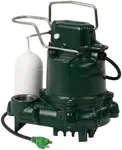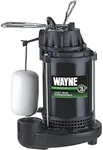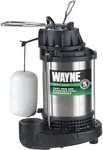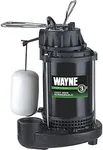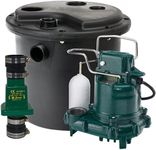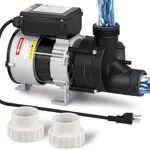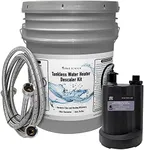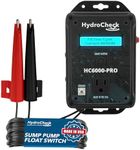Buying Guide for the Best Water Pumps For Home
Choosing the right water pump for your home can be a daunting task, but with the right information, you can make an informed decision that meets your needs. Water pumps are essential for various household applications, such as supplying water to your home, garden irrigation, and draining water from flooded areas. To select the best water pump, you need to consider several key specifications that will determine the pump's suitability for your specific requirements.Flow RateFlow rate, measured in liters per minute (L/min) or gallons per minute (GPM), indicates how much water the pump can move in a given time. This spec is crucial because it determines how quickly the pump can complete its task. For small household tasks like watering a garden, a lower flow rate may suffice. For larger tasks, such as supplying water to an entire home, a higher flow rate is necessary. Assess your water needs to determine the appropriate flow rate for your pump.
Head HeightHead height, measured in meters or feet, refers to the maximum height the pump can lift water. This is important for understanding the pump's ability to move water vertically. If you need to pump water to a higher elevation, such as to an upper floor of a house or a tall garden, you will need a pump with a higher head height. Consider the vertical distance the water needs to travel when choosing a pump with the right head height.
Power SourceWater pumps can be powered by electricity, gasoline, or solar energy. The power source affects the pump's portability, efficiency, and suitability for different environments. Electric pumps are ideal for indoor use and areas with reliable power supply. Gasoline pumps are more portable and can be used in remote locations without electricity. Solar pumps are eco-friendly and cost-effective in sunny regions. Choose a power source that aligns with your usage environment and convenience.
Pump TypeThere are various types of water pumps, including centrifugal, submersible, and diaphragm pumps. Centrifugal pumps are great for general water transfer and irrigation. Submersible pumps are designed to operate underwater and are ideal for deep wells or flooded areas. Diaphragm pumps are suitable for handling dirty water or water with debris. Identify the specific application you need the pump for and select the type that best matches your requirements.
Material and DurabilityThe material of the pump affects its durability and suitability for different water types. Pumps made from stainless steel or high-quality plastic are resistant to corrosion and ideal for clean water. Cast iron pumps are robust and can handle dirty water but may be prone to rust. Consider the water quality and the pump's exposure to elements when choosing a material that ensures longevity and reliability.
Noise LevelNoise level is an important consideration, especially if the pump will be used in or near living areas. Some pumps can be quite noisy, which may be disruptive. Look for pumps that are designed to operate quietly if noise is a concern. Manufacturers often provide noise level ratings, so check these specifications to find a pump that operates at an acceptable noise level for your home environment.
